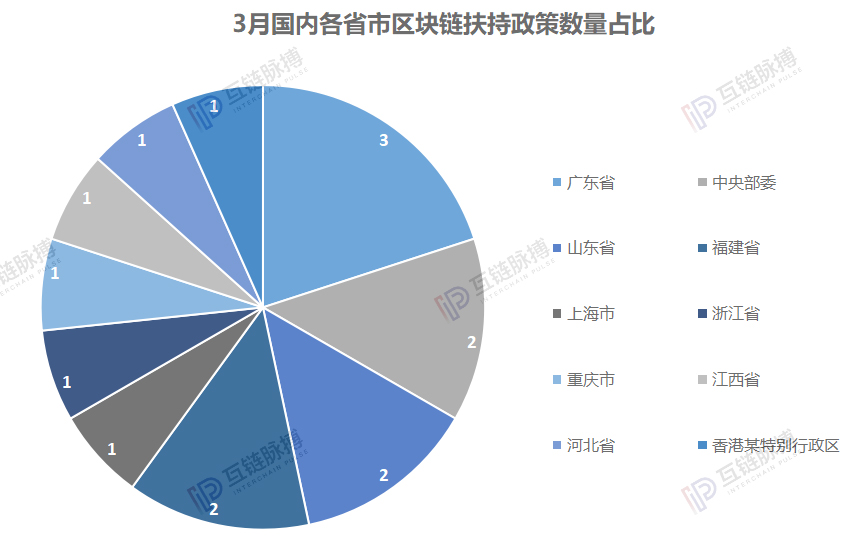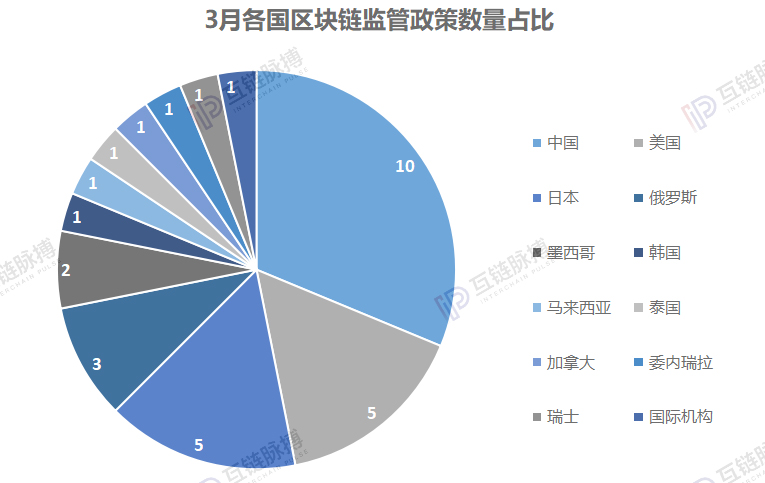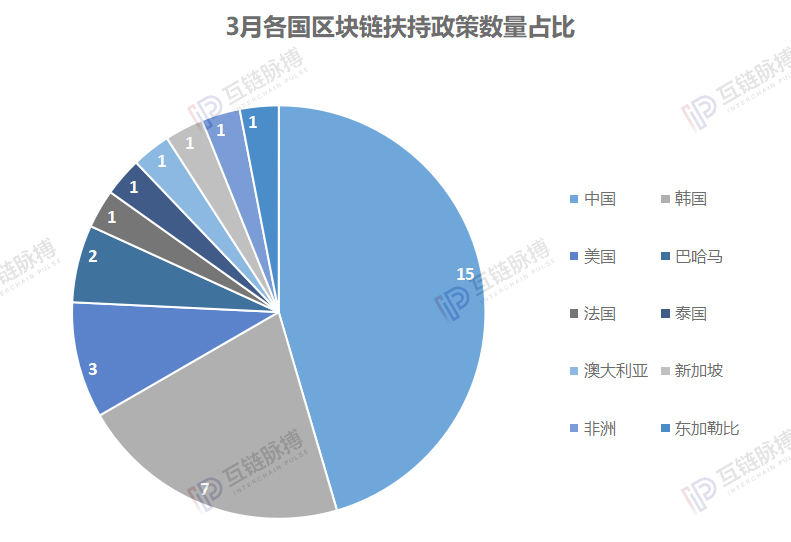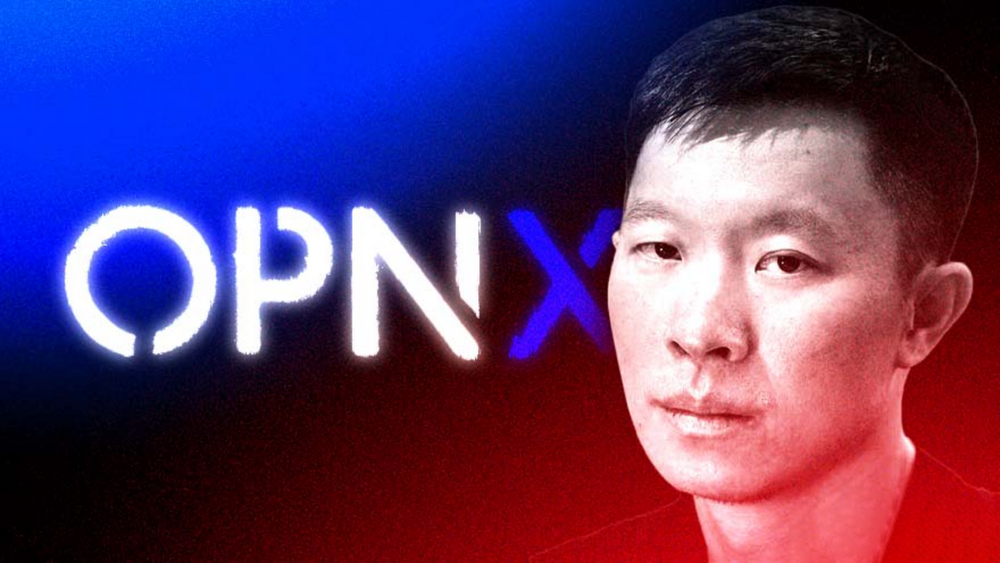Blockchain Policy March Report: Guangzhou Centralized Release Support Policy to Create Blockchain Industrial City?
At the end of March, major issues in the domestic blockchain supervision and blockchain support continued. In terms of support, the Huangpu District of Guangzhou City issued the “Blockchain 10 2.0” policy; in terms of supervision, the Netcom Office issued the first list of filings.
At the same time, foreign countries have also carried out relevant supervision and support activities. Inter-chain pulse observation, including China, increased capital investment in the blockchain field in March, and promoted the development of blockchain technology and applications.
Domestic: Beijing re-supervises Guangzhou's support
According to the statistics of inter-chain pulse, in March, there were 10 policy information on the supervision of domestic blockchain, and the number increased by a certain amount compared with the previous two months.
Among the information related to the supervision of a total of ten blockchains, the most important one is that on March 30, the National Internet Information Office released the first batch of domestic blockchain information service filing number, and urged the undocumented entity to fulfill its filing obligations as soon as possible. The Mutual Chain Pulse Institute also conducted a comprehensive review of the first batch of projects that have been filed.
- Why can't Monroe maintain a hard-for-half plan for half a year?
- Really unexpected! The Fed system took the opportunity yesterday, and the normal running time of Bitcoin can reach 99.9835%.
- Blockchain concept stocks limit: Which technologies are regulated by regulation?
In addition, government agencies in Beijing, Shanxi, Hebei, and Zhangzhou reminded the public to be wary of virtual currency blockchain scams. On March 7, Beijing Banking Insurance Regulatory Bureau said that it was wary of virtual currency blockchain scams. On March 22, the Beijing Mujin Association issued a document to prevent the risk of illegal activities in the name of STO.
At the end of March, Jiangsu Province also stated that it will fully implement the enterprise standard leader system and set standards in areas such as blockchain.
Compared with supervision, China's blockchain policy information is more concentrated in the support field. In March, there were 15 relevant information on blockchain support policies in various provinces and cities in China.

(Cartography: Mutual Chain Pulse Institute Data Source: Public Information)
Among them, Guangdong Province has the largest proportion, and 3 related information are concentrated in Guangzhou.
On March 20th, Guangzhou Science and Technology Bureau said: Guangzhou has made new breakthroughs in science and technology innovation work, targeting future industries such as blockchain. On March 28, there were two relevant information in Huangpu District of Guangzhou City: Guangzhou will pilot “blockchain + commercial services” in Huangpu District to promote commercial registration reform; Guangzhou Huangpu issued “blockchain 10 2.0” policy, excellent Blockchain talents have apartment rentals and rental subsidies.
The same is the larger central ministries, Shandong Province, Fujian Province, there are 2 blockchain support policy related information.
On March 20th, Shandong Province issued a notice to promote the deep integration of technologies such as blockchain. On March 29th, the “Ten Policy for Promoting Industrial Development in the Leading Areas” promulgated by Jinan Xianxing District was announced, encouraging the promotion and application of technology such as blockchain, and giving a maximum of 3 million awards.
At the end of March, the secretary of the Fujian Provincial Party Committee said that it will vigorously develop new industries and new business forms such as blockchains and comprehensively enhance industrial competitiveness. The "Finance of Digital Fujian in 2019" issued by the General Office of the Fujian Provincial Government proposed to support the establishment of a blockchain economic comprehensive experimental zone in Fuzhou.
In addition, relevant administrative policy information has been released in Shanghai, Zhejiang, Chongqing, Jiangxi, Hebei, and Hong Kong. Basically, local governments have expressed their active efforts to promote the research and application of blockchain technology.
Foreign countries: US and Japan use to strengthen supervision of Korean funds to support blockchain
In March, there were 22 relevant information on foreign blockchain regulatory policies. Among them, the United States and Japan released the most regulatory information, respectively.

(Cartography: Mutual Chain Pulse Institute Data Source: Public Information)
The information on the US blockchain regulatory policy is basically related to the development of the cryptocurrency bill. On March 1, California lawmakers proposed a new bill regulating the cryptocurrency business; on March 14, the US House of Representatives passed the FinCen Improvement Act to track currency flows including cryptocurrencies; on March 19, the US SEC sought Feedback on cryptographic assets and hosting rules; on March 22, New York has introduced the cryptocurrency bill, and the number of operating licenses is expected to increase within two years.
Japan also regulates cryptocurrencies and “quasi-exchanges”. On March 8th, the Japan Virtual Money Business Association issued a "ICO new regulation proposal"; on March 15, Japan passed the gold business law and the fund settlement algorithm amendment, the Financial Affairs Department held a press conference to introduce new encryption-related regulations, the Japanese Gold Business Law The amendment sets a time limit for "quasi-exchange" license applications; on March 19th, Japan will limit the leverage of digital currency leverage trading.
In addition to the United States and Japan, Russia and Mexico also have a number of policy information related to blockchain regulation.
In early March, Russia formulated regulatory measures for offshore areas, including cryptocurrency regulation; the Russian Parliament passed the Digital Financial Assets Act on second reading. In mid-March, the Russian central bank proposed to limit the sale of encrypted assets to “unqualified investors”.
In Mexico, the central bank has issued encryption regulations. On March 8, the Mexican central bank issued encryption regulations that did not allow financial companies to provide cryptocurrencies. On March 22, the Central Bank of Mexico wanted to limit cryptocurrency transactions.

(Cartography: Mutual Chain Pulse Institute Data Source: Public Information)
Mutual chain pulse statistics. In March, there were 18 relevant information on foreign blockchain support policies, with the largest number in South Korea (7), followed by the United States (3) and the Bahamas (2).
This month, South Korea's multi-sectoral and local governments proposed to invest in blockchain applications, blockchain industries, and blockchain companies. On March 3, the Korean government unit and the private enterprise proposed a budget of 8.7 billion won for the development of three blockchain platforms. On the 13th, the Busan Port Authority of South Korea will use the blockchain and other technologies to develop the port security system and obtain the Ministry of Science and Technology. On the 13th, the Korea Patent Office will focus on supporting startups such as blockchains. On the 21st, Gyeongsangbuk-do, South Korea will invest 1.3 billion won to promote the blockchain industry.
In addition, on March 25, the Korean National Assembly first proposed a bill to promote the blockchain industry. The bill includes the establishment of a blockchain technology research foundation, training of professionals and support for start-ups. In summary, the Korean government is vigorously promoting the application of blockchain technology, as well as the development of blockchain talents and enterprises.
At the same time, the United States and Australia also invested in the blockchain sector in March. On March 20th, the US Department of Health and Human Services invested $7 million to explore technologies such as blockchain. On March 18th, the Australian federal government will contribute 100,000 Australian dollars to boost the blockchain industry.
Interchain Pulse Statistics of Blockchain Policy for March 2019:
We will continue to update Blocking; if you have any questions or suggestions, please contact us!
Was this article helpful?
93 out of 132 found this helpful
Related articles
- Elon Musk said that he is the former CEO of the dog, is the real platform or the April Fool's Day joke?
- Bitcoin skyrocketing: or related to the Turkish currency crash
- Jason Qiao, Plato's Chief Eco Officer: Blockchain needs to focus on privacy protection
- Authoritative release | Ministry of Industry and Information Technology directly under the China Information and Communication Institute issued blockchain special research report
- Analyst: BTC key position is approaching, technical indicators release buy signal
- Quotes on April 3: The plate rotation is obvious, pay attention to the rhythm
- Bitcoin is back to $5,000 and is about to return to the bull market?






